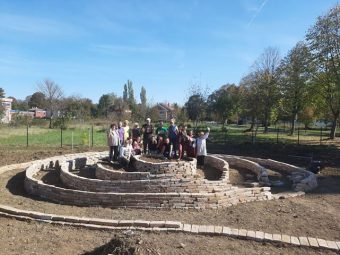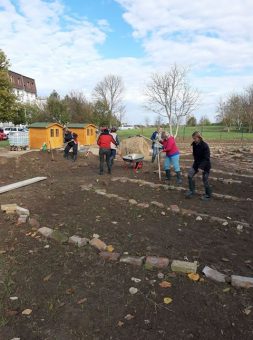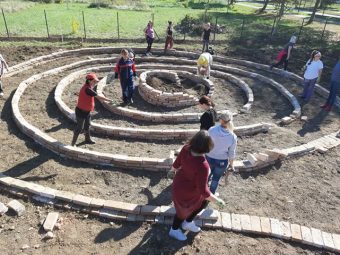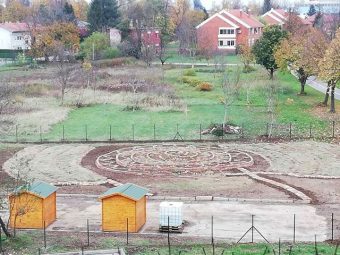
Organic fruits, vegetables and herbs have become very popular on the market in recent years, so has the need for their production. Recognizing the importance of this trend, land potential in their environent, as well as the needs of their fellow citizens, the Women’s Association “Vukovar” once again made good use of the support of European Union funds and implemented a project that will train forty-two citizens for organic farming, herbs cultivation and processing.
The Women’s Association “Vukovar” has been active within the local community for more than twenty years, intending to more engage vulnerable groups of citizens, such as elders and unemployed women, victims of domestic violence and members of national minorities, in social de-velopment and decision-making and contribute the better quality of life for them. They carry out their activities by implementing both national and EU programs and projects. One of them, currently underway, is the Eco Start project, with the aim to empower citizens who are interested in producing organic fruits, vegetables, and also in producing, growing and processing herbs. Like many other projects they have implemented so far, this one is supported by the EU Fund, whose competitions the Association monitors regularly and in which participates when they can be aligned with the needs and capabilities of the local community.

“Our activity is based on listening to the real needs of citizens and other community organisations, and by organising and implementing activities, we influence the information, education and empowerment of marginalised groups of society. We regularly monitor the announcements of the competition and report to those areas where our Association is active. Preparing a project is not a difficult job if it involves projects that follow our vision and mission and contribute to the achievement of our goals, as well as the goals of a particular competition. All of our projects are based on the protection of human rights, the development of the local community, improving the lives of old and infirm people, as well as encouraging the employment of vulnerable groups of society”, says Jelena Jankovic, a member of the Association. “For the project to get funding from the EU funds and to be implemented, it is important to have the human capacities for its realisation, project partners, and the project activities themselves should be relevant to the target group which is involved in the project. Also the project must contributes to the achievement of the objectives set out in the relevant national and regional strategic documents in the area of the competition. The advantage is if the project has greater regional coverage.”
The Eco Start project started a year ago was written in collaboration with an adult school and with them agreed to implement training for two programs – an ecological producer of vegetables, fruits and aromatic herbs and aromatic and spice herbs producer and processor. The City of Vukovar supported them by giving land for practical training.
“The response of the participants is good, which shows that the interest in organic agriculture has increased recently and that people started to take care of what they eat, where they buy food and if that food is really organic”, our interlocutor said, adding that forty-two people were involved in the project, divided into two equal groups for each training program. The largest number of students were middle-aged women who have been unemployed for a long time. “The target group of this project is the unemployed, young people and women. We want to enable them to become more competitive in the labour market by acquiring new knowledge and skills and giving good support to those who want to start their own business in organic agriculture,” emphasizes Jelena Jankovic.

Those who wish to embark on this type of work after completing the training can count on national and EU funds. “The importance of organic production in Croatia can be seen in the continued financial support for ecological production through grants under state and EU assistance. The state stimulates producers to decide to engage in organic production through constant finance and other forms of support”, explains Jelena Jankovic. She also adds that the reason for the growing number of areas under organic farming can be found in the realisation of support for organic agriculture, financed from the European Agricultural Fund for Rural Development, under measure 11 – “Organic farming”. Besides, users involved in organic production can earn extra points in most public calls within the Rural Development Program. In this way, additional work and effort are rewarded.
What has further encouraged the realisation of this project is the fact that the environment of Vukovar is well suited for organic production and rich in arable land. In fact, our interlocutor points out, the whole of Croatia has quality, but underutilised land for organic farming, because such products are harder to grow, and they are much more expensive on the market. However, demand for organic products is increasing, and since 2010 records an increase in the number of organic producers in Croatia, which certainly has been contributed by incentives in organic farming.
The training program for producers and processors of aromatic and spicy herbs is conducted through two hundred and two hours of theory and practice, and the training program for organic producers of fruits, vegetables and aromatic herbs lasts one hundred and fifty hours. In addition to getting basic knowledge of plants, vegetables and fruits, production and processing technology, they also learn about occupational safety and health, fire protection and first aid. The training is not completed yet, the practical part of the course is currently underway, and after that, the participants will pass workshops “From field to table” and “How to get your job in agriculture”. After that, the twenty most motivated will receive five career counselling hours and assistance in developing a business plan.
In focus:
In addition to the Eco Start project, the Women’s Association “Vukovar” is currently implementing two other EU projects – Wish for Vukovar. With this project, they employed ten women for helping the elderly at home and the New Knowledge – New Opportunities project, which offers the possibility of free training for designing and implementing projects from EU funds for the unemployed and the long-term unemployed. Beside EU projects, the Association also implements national projects whose aim is to improve the quality of life of people in their community and ensure better accessibility of social services.

“Within our association, there is a Club of Third Age Persons, where fifteen to twenty people gather every day in the afternoon. For the fourth year in a row, we have been conducting daily activities for the elderly, such as exercises with the help of a physiotherapist, measuring sugar and blood pressure, cultural and entertaining activities (creative workshops, natural cosmetics workshops, reading rooms, games for improving memory, etc). Also, we are authorised to provide free legal aid, we have an SOS line that operates every day from 8 am to 6 pm”, says our interlocutor.
The Women’s Association “Vukovar” cooperates with similar organisations in the region. Through a three-year Empowerment to Better Integration program, they carry out part of their activities in rural areas to contribute to the widening of alternative social services where they are not available, assisted by organisations operating in those areas. They also have good cooperation with local self-government, institutions and establishments. They are members of the Gender Commission, the County Team for Combating Violence against Women and Domestic Violence, the Mobile Trafficking Team, the Women’s Network, the SOS Network and the PETRA Network.
Prepared by: Tamara Zjacic
This article was published in the new issue of the Energy portal Magazine NATURAL RESOURCES, march – may, 2020

